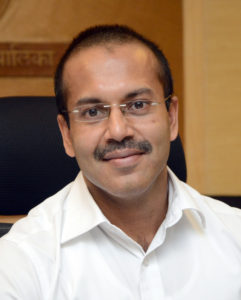Mr. Kunal Kumar - Municipal Commissioner, Pune, Maharashtra (India) :Government of India
Exclusive Interview on SMART CITIES AND SUSTAINABILITY for CASI Global

There are numerous definition of a Smart City. It varies from country to country based on the demography and socio-economic conditions of the nation. It depends on the level of development, the service levels of city infrastructure and public services, willingness to change and reform, resources one possesses, aspirations and mindsets of the residents. For us, a smart city leverages a range of possibilities – from information technology to best practices for public policy, from pro-active involvement of the private sector to generating minimal cost and sustainable solutions to the most pressing needs of its citizens. As rightly said by our Hon’ble Prime Minister, a Smart City is a City, which is a step or two ahead of people’s aspirations and strives to evolve with time to create distinctive quality of life for its citizens.
The Smart City Mission by the Ministry of Urban Development, Government of India is a great initiative to improve quality of life of citizens in Indian urban centers. The Smart City challenge is first competition of its kind in India and we believe that it is a big step towards empowerment of citizens and that this will lead to inclusive development of cities and states.
Further, since the focus is on developing smart solutions, we hope to see more effective and prudent use of existing resources, cost effective and sustainable solutions to problems that are plaguing the common man. The solutions coming out of the contest will serve as the lighthouse for similar developments in other cities not only in India, but in the rest of the developing and developed world. I think his is an innovative and effective way to leverage the intellect of the citizens and generate inclusive and intelligent solutions. This competitive mechanism would end the top-down approach to city planning and development, and boost our push towards people-centric urban development.
Globally, there has been much development in the Smart City domain. Cities like Barcelona, Amsterdam, New York, Tel Aviv and Seoul have emerged as innovators and pioneers in Smart solutions and have received several international accolades and awards. The Smartest cities of today have emerged in developed countries where the quality of public infrastructure and quality of life of citizens was already high. Consequently, smart solutions have led to an uptick to the already high livability index in these cities.
Smart Cities in the Indian context are different. The quality of public infrastructure is much lower in Indian cities than their counterparts in developed countries and the service levels of Public Services is much lower in India. We are still struggling with basic socio-economic problems and the adoption of technology is much lower. Therefore, the model followed in the developed countries may not work in India and we will have to come up with indigenous, innovative and low-capex solutions to solve our cities’ problems.
Pune is a unique city. Our strengths as a city include a strong base of human capital and a large young population. We are the only city in India to follow participatory budgeting and we are the best in the country in managing and recycling solid waste. We are blessed with abundant water supply, lots of trees and greenery, and we enjoy great climate round the year. That said, there is significant scope to improve the public infrastructure around roads, public transport, water, sewerage and other sectors. Through we are still in the process of finalizing the vision for Pune using extensive citizen engagement, personally my dream for Pune is to make it the most livable city in India. I see Pune as a clean and green environment that offers high quality of life for citizens from all socio-economic classes. I see Pune as the torchbearer in innovation, research and technology in India, which provides plenty of employment opportunities for its citizens. A city that has a low carbon footprint and where the citizens live in harmony with the environment.